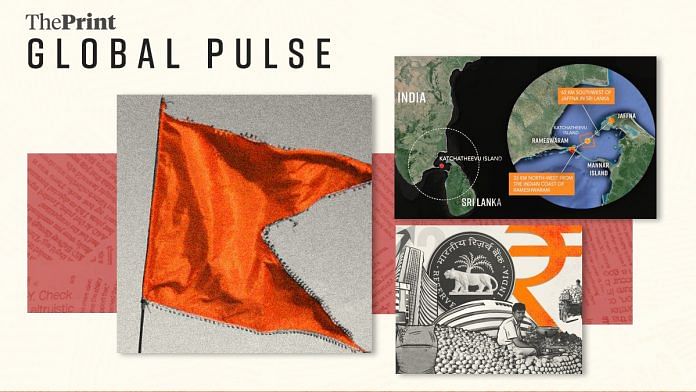New Delhi: As the world’s fifth-largest economy and third in terms of purchasing power parity, can India cruise past China to emerge as the world’s growth engine? A take in Bloomberg by Dan Strumpf, Anup Roy, and Abhishek Gupta says India can become the biggest contributor to global GDP growth by 2028 on a purchasing power parity basis if the nation achieves targets in four key development areas.
In an opinion piece for Financial Times, Ruchir Sharma elaborates on “how voters (in India) are increasingly willing to trade political freedom for economic progress” and how this phenomenon is similar to what happened in South Korea and Taiwan after World War II.
In The Wall Street Journal‘s financial and economic analysis column, Heard On The Street, Megha Mandavia analyses how American investors are lauding the new India, “which is undergoing a democratic recession, but its economic might is on the rise”.
From Essentials of Hindutva by Vinayak Damodar Savarkar to Modi’s India: Hindu Nationalism and the Rise of Ethnic Democracy by Christophe Jaffrelot, The Economist in a piece dated 5 April suggested six books to learn about the origins and ideology behind Hindutva, what it calls “the dangerous ideology of India’s ruling party”.
Other suggested books include Messengers of Hindu Nationalism: How the RSS Reshaped India by By Walter Andersen and Shridhar D. Damle, Bunch of Thoughts by M.S. Golwalkar, Hindu Nationalism in the Indian Diaspora: Transnational Politics and British Multiculturalism by Edward T.G. Anderson, and Love Jihad and Other Fictions: Simple Facts to Counter Viral Falsehoods by Sreenivasan Jain, Mariyam Alavi and Supriya Sharma.
Katchatheevu row
Manik DeSilva, editor of Colombo-based weekly — Sunday Island, opines in Sri Lanka Guardian that by raking up a controversy over the Katchatheevu island in the run-up to the Lok Sabha election, PM Modi and BJP are “bottom-trawling” for votes in Tamil Nadu.
Hiran W. Jayewardene, former ambassador and head of the Sri Lankan delegation to the UN Conference on the Law of the Sea, in an opinion piece in The Island, says the onus is on India to “ensure an amicable, fair & transparent solution” to settle the issue of “poaching in Sri Lankan waters”.
Headliners from Turkey, Switzerland
For the first time, the European Court of Human Rights has observed that the Swiss government violated citizens’ human rights by not doing enough to fight climate change. To know more about this case filed by elderly women, who claimed to be more prone to the effects of climate change, read this report in The New York Times.
Turkey Tuesday restricted the export of 54 products to Israel, including iron and steel products, cement, chemicals, pesticides and bricks, and called for a ceasefire in the Israel-Gaza conflict. Read Al Jazeera’s report to know how Israel has reacted and more.
(Edited by Madhurita Goswami)
Also read: Bhagat Singh, again — how AAP’s using Kejriwal’s incarceration to project itself as BJP’s main rival



